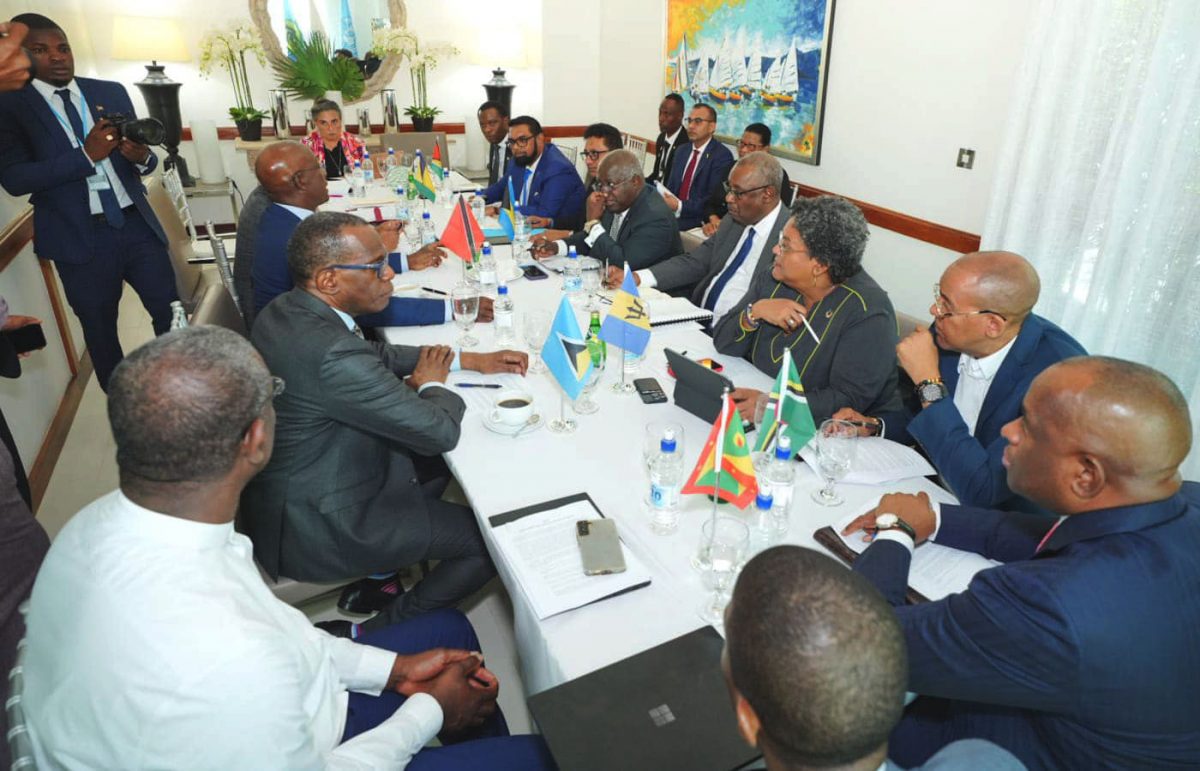`WPA strongly feels that CARICOM’s leadership has sacrificed Guyana’s territorial interests for its own narrow political and economic interests’
The Working People’s Alliance (WPA) has expressed its discomfiture with the recent St Vincent Summit between Presidents Irfaan Ali and Nicolas Maduro and is of the opinion that Venezuela gained an advantage at Guyana’s expense.
It also feels let down by the Caribbean Community’s (CARICOM) self-interests.
This was stated by the WPA in a release on Friday which also stated that the party was skeptical of the objectives of the meeting. “While we believe that bilateral dialogue between Guyana and Venezuela should not be taken off the table, we do not think it should have been a first resort.”
The WPA, which was part of the APNU+AFC government in 2015, noted that although it was fully aware of Venezuela’s desire for such a meeting, it believes that that country was “unconditionally rewarded” which should not have been. Further, it was also cognisant that Venezuela desired a substitute for the ICJ process – a process which it has “unequivocally” rejected. And as far as the party is concerned, a minimum condition for such a meeting therefore should have been Venezuela’s withdrawal of the decrees enacted in the wake of the referendum and a cessation of all hostilities towards Guyana. As such, it says Guyana’s failure to get Venezuela to agree to these conditions meant that President Ali walked into the “proverbial political trap,” and “His declaration that he would not discuss the border controversy was naïve on his part.”
The spearheading of the meeting by St Vincent and the Grenadines Prime Minister Dr Ralph Gonsalves and his CARICOM colleagues also did not sit well with the WPA. It viewed the remarks of some CARICOM leaders on the developments over the last few weeks as proof of where they really stood on this whole matter. The release opined that there was “no guarantee” that these leaders were prepared to take a “principled stand” in support of Guyana’s just case as their position is driven by their “gratitude” to Venezuela for its economic aid to their countries. As such, the WPA indicated that it was “disgusted by this hustler mentality which has poisoned the region’s elite political culture.”
Thus, it is against this background that the WPA expressed its disappointment with the Argyle Declaration, while noting however, that it was not surprised.
“We are of the firm view that the Argyle Declaration in its totality represents an advantage for Venezuela at the expense of Guyana’s interests. In this regard WPA strongly feels that CARICOM’s leadership has sacrificed Guyana’s territorial interests for its own narrow political and economic interests,” adding, “This flies in the face of the traditional spirit of Caribbean integration.”
The release proceeded to set out six points that it felt would further clarify its position on the St. Vincent Summit.
Firstly, it stressed that it could not be “accidental” that the declaration describes the matter as a “dispute” between Guyana and Venezuela and thus calls on the two countries to de-escalate hostilities. “This is a slap in Guyana’s face.” It pointed out that from the standpoint of international law, Essequibo is not disputed territory. Further, Guyana has never in word or deed threatened Venezuela on this matter. Rather it is Venezuela which has since 1966 been hostile to Guyana.
Secondly, it sees the insertion of the Geneva Agreement as a central clause in the declaration and the omission of the ICJ process as a coup in favour of Venezuela. It pointed out that although the Geneva Agreement provides a forum for dialogue, it was never intended to determine the validity of the 1899 Arbitration Award. “This historic position by Guyana has not been endorsed by the Argyle Declaration—a failure that in effect amounts to an endorsement of Venezuela’s official position.”
Thirdly, it was noted that while WPA accepts that Venezuela’s agreement to cease hostilities towards Guyana could provide some space and time for the latter to rally more support for its cause, the price it paid was too high. It is clear, it posited, that Maduro has something to take back to his supporters while the Guyana government came out of the meeting without any tangible gains, and warned, “This lopsided outcome hurts Guyana’s morale and could be detrimental to its case in the medium to long term.”
The release also hastened to point out that Venezuela’s threat to Guyana was not just military in nature, but also economic as that country is threatening to stifle Guyana economically. As such, their decision to pass a budget for Essequibo and to arrogate unto itself the right to authorise investments in the territory should not be underestimated.
Fourthly, WPA reiterated its long-held view that the Guyana Government must hastily move to lead the crafting of a national initiative to combat Venezuela’s aggression. “This must include at a minimum an All-Party Forum which should take full advantage of all the technical and professional expertise at our disposal. The WPA does not rule out other more robust forms of national governance.
Fifthly, the party is fully supportive of the weaponizing of the army to meet the current military challenges. It opined that this must be part of an overall strategy that clearly defines the role of the armed forces in non-partisan terms. And although it acknowledged the political and ethnic sensitivities of this issue, it feels the urgency of the matter requires some degree of flexibility by the political forces. As such, “it is our view that the government must make every effort to ensure that all groups in society are encouraged to join the army. Defence of the country should transcend the ethno-racial divide.”
Finally, the WPA stated its support for what it referred to as “a genuine developmental plan” that takes into consideration the Venezuelan threat. “It is our view that economic development cannot be divorced from the defence of our territorial integrity. The alleviation of poverty, for example, must be pursued in a more structural manner and with much more purpose,” the release added.






